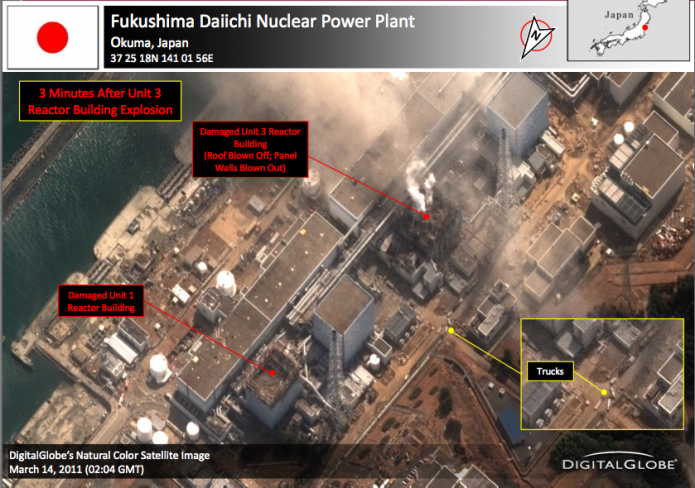
In the wake of the crisis at the Fukushima Nuclear plant in Japan last week, BBC Radio contacted me. In this five minute interview, aired this morning, I also talk about the Neutron Trail, my grandfather Enrico Fermi’s response and the future of nuclear energy.
Listen to Olivia Fermi – BBC World Update Radio Interview
To read the transcript:
Transcript of BBC World Update Radio Interview, aired March 21, 2011
Presenter: Dan Damon, Producer: Pearse Lynch
BBC: The work continues on the Fukushima plant. The disaster there has reignited the debate surrounding nuclear energy: gift or curse?
Olivia Fermi is someone who understands that dilemma at a personal level.
Her grandmother Laura Fermi was a writer and environmental pioneer.
Her grandfather Enrico Fermi was the Nobel Laureate, experimental and nuclear physicist known for his development of the first nuclear reactor — known as Chicago Pile I — and with J. Robert Oppenheimer is frequently referred to as the father of the atomic bomb.
I asked Olivia Fermi if coming from an inheritance of nuclear understanding gives her a greater level of comfort or perhaps a heightened concern over humanity’s relationship with the atom.
Fermi: Growing up with it has made me more aware of it. From the age of five, I was made aware of the power and dangers of nuclear energy. It’s like Mothers Against Drunk Drivers. If you’re put into that situation then you tend to think about it more.
We need nuclear energy now. We’re a planet of seven billion people. It’s kind of like we’re halfway through the birth canal with nuclear energy. We have a lot of problems to deal with and yet it’s giving us power. The Japanese people as a whole are suffering because of a lack of power right now and fresh water and they’re having to ration electricity.
BBC: You didn’t know your grandfather but you learned a lot about him from your grandmother and your family. What was his idea of the potential danger and benefit from nuclear power, from nuclear fission?
Fermi: That’s a very tough question to answer. My grandfather was very quiet on political matters. I found a quote from shortly before he died (in 1954), where he talks about technology outstripping our maturity as a race or as a society to handle. And that he fervently hoped that we would grow to handle it properly.
BBC: Did he have doubts about what he had done, about what he had helped to create? For example, like Oppenheimer he began to worry about what he did.
Fermi: I’m sure he did. He was never as outspoken as Oppenheimer or Niels Bohr or Bethe or Szilard or many of the other scientists. My grandmother, his wife, was a Jew in Italy [where fascism and anti-Semitism were taking over, putting my grandmother, my mom and her brother at grave risk]. They fled Italy when my grandfather won the Nobel Prize in 1939. They were Italians and in the United States at that time Italians were enemy aliens because Italy was allied with Hitler.
My grandfather had top-secret clearance, the highest top-secret clearance that can be given to a civilian. At the same time he was an enemy alien. I think that kept him very active in science and very quiet politically.
On top of that, he was impeccable in his work, one of the most brilliant scientists of the twentieth century. I think he had a, maybe, naiveté or professional blindness that politicians and policymakers would be as impeccable with their work as he was with his. He believed very strongly in open science and in democracy.
BBC: Tell me about the Neutron Trail.
Fermi: The Neutron Trail is a project I started. It came out of a personal inquiry visiting the people and places most impacted by our shared nuclear legacy. I’ve been going around visiting and meeting physicists, activists, environmental activists, artists. It’s quite a journey to start with this premise where we’re not following through with nuclear waste and yet on the other hand benefiting from the power.
If government or whatever body it is allows nuclear waste to be put in cardboard boxes and dumped in trenches, as it was in the Savannah River Plant, which is one of the largest plants in the United States, then of course, people are going to be harmed. The Neutron Trail is all about looking at all the different realities and putting them together so that we can basically face what we’ve done in the past and make better decisions in the future.
BBC: That’s Olivia Fermi. Her grandfather was one of those who developed the first nuclear reactor and the future of nuclear power is something that she worries about and wonders about all the time. If you google “BBC World Update”, you’ll be able to see some pictures Olivia sent us including a couple of pages from her grandfather’s notebook. Just some remarkable documents there. And if you understand them, it will be interesting to hear from you.
You’ve been listening to World Update from the BBC in London.


 Twitter
Twitter
Pingback: BBC World Radio Interview with Olivia Fermi